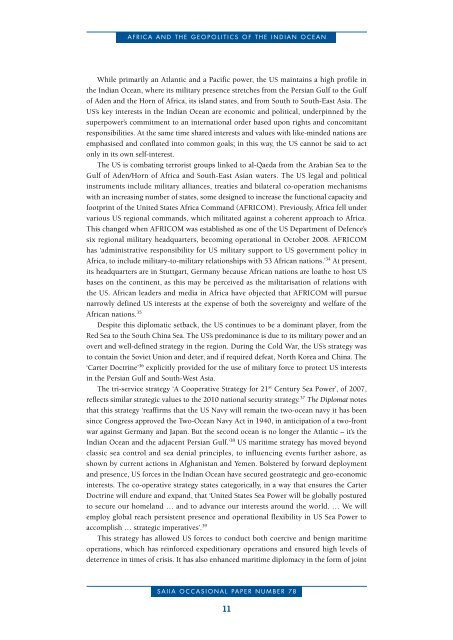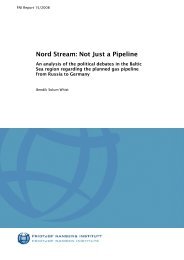Africa and the Geopolitics of the Indian Ocean
Africa and the Geopolitics of the Indian Ocean
Africa and the Geopolitics of the Indian Ocean
Create successful ePaper yourself
Turn your PDF publications into a flip-book with our unique Google optimized e-Paper software.
AfRICA ANd thE gEOPOLItICS Of thE INdIAN OCEAN<br />
While primarily an Atlantic <strong>and</strong> a Pacific power, <strong>the</strong> US maintains a high pr<strong>of</strong>ile in<br />
<strong>the</strong> <strong>Indian</strong> <strong>Ocean</strong>, where its military presence stretches from <strong>the</strong> Persian Gulf to <strong>the</strong> Gulf<br />
<strong>of</strong> Aden <strong>and</strong> <strong>the</strong> Horn <strong>of</strong> <strong>Africa</strong>, its isl<strong>and</strong> states, <strong>and</strong> from South to South-East Asia. The<br />
US’s key interests in <strong>the</strong> <strong>Indian</strong> <strong>Ocean</strong> are economic <strong>and</strong> political, underpinned by <strong>the</strong><br />
superpower’s commitment to an international order based upon rights <strong>and</strong> concomitant<br />
responsibilities. At <strong>the</strong> same time shared interests <strong>and</strong> values with like-minded nations are<br />
emphasised <strong>and</strong> conflated into common goals; in this way, <strong>the</strong> US cannot be said to act<br />
only in its own self-interest.<br />
The US is combating terrorist groups linked to al-Qaeda from <strong>the</strong> Arabian Sea to <strong>the</strong><br />
Gulf <strong>of</strong> Aden/Horn <strong>of</strong> <strong>Africa</strong> <strong>and</strong> South-East Asian waters. The US legal <strong>and</strong> political<br />
instruments include military alliances, treaties <strong>and</strong> bilateral co-operation mechanisms<br />
with an increasing number <strong>of</strong> states, some designed to increase <strong>the</strong> functional capacity <strong>and</strong><br />
footprint <strong>of</strong> <strong>the</strong> United States <strong>Africa</strong> Comm<strong>and</strong> (AFRICOM). Previously, <strong>Africa</strong> fell under<br />
various US regional comm<strong>and</strong>s, which militated against a coherent approach to <strong>Africa</strong>.<br />
This changed when AFRICOM was established as one <strong>of</strong> <strong>the</strong> US Department <strong>of</strong> Defence’s<br />
six regional military headquarters, becoming operational in October 2008. AFRICOM<br />
has ‘administrative responsibility for US military support to US government policy in<br />
<strong>Africa</strong>, to include military-to-military relationships with 53 <strong>Africa</strong>n nations.’ 34 At present,<br />
its headquarters are in Stuttgart, Germany because <strong>Africa</strong>n nations are loa<strong>the</strong> to host US<br />
bases on <strong>the</strong> continent, as this may be perceived as <strong>the</strong> militarisation <strong>of</strong> relations with<br />
<strong>the</strong> US. <strong>Africa</strong>n leaders <strong>and</strong> media in <strong>Africa</strong> have objected that AFRICOM will pursue<br />
narrowly defined US interests at <strong>the</strong> expense <strong>of</strong> both <strong>the</strong> sovereignty <strong>and</strong> welfare <strong>of</strong> <strong>the</strong><br />
<strong>Africa</strong>n nations. 35<br />
Despite this diplomatic setback, <strong>the</strong> US continues to be a dominant player, from <strong>the</strong><br />
Red Sea to <strong>the</strong> South China Sea. The US’s predominance is due to its military power <strong>and</strong> an<br />
overt <strong>and</strong> well-defined strategy in <strong>the</strong> region. During <strong>the</strong> Cold War, <strong>the</strong> US’s strategy was<br />
to contain <strong>the</strong> Soviet Union <strong>and</strong> deter, <strong>and</strong> if required defeat, North Korea <strong>and</strong> China. The<br />
‘Carter Doctrine’ 36 explicitly provided for <strong>the</strong> use <strong>of</strong> military force to protect US interests<br />
in <strong>the</strong> Persian Gulf <strong>and</strong> South-West Asia.<br />
The tri-service strategy ‘A Cooperative Strategy for 21 st Century Sea Power’, <strong>of</strong> 2007,<br />
reflects similar strategic values to <strong>the</strong> 2010 national security strategy. 37 The Diplomat notes<br />
that this strategy ‘reaffirms that <strong>the</strong> US Navy will remain <strong>the</strong> two-ocean navy it has been<br />
since Congress approved <strong>the</strong> Two-<strong>Ocean</strong> Navy Act in 1940, in anticipation <strong>of</strong> a two-front<br />
war against Germany <strong>and</strong> Japan. But <strong>the</strong> second ocean is no longer <strong>the</strong> Atlantic – it’s <strong>the</strong><br />
<strong>Indian</strong> <strong>Ocean</strong> <strong>and</strong> <strong>the</strong> adjacent Persian Gulf.’ 38 US maritime strategy has moved beyond<br />
classic sea control <strong>and</strong> sea denial principles, to influencing events fur<strong>the</strong>r ashore, as<br />
shown by current actions in Afghanistan <strong>and</strong> Yemen. Bolstered by forward deployment<br />
<strong>and</strong> presence, US forces in <strong>the</strong> <strong>Indian</strong> <strong>Ocean</strong> have secured geostrategic <strong>and</strong> geo-economic<br />
interests. The co-operative strategy states categorically, in a way that ensures <strong>the</strong> Carter<br />
Doctrine will endure <strong>and</strong> exp<strong>and</strong>, that ‘United States Sea Power will be globally postured<br />
to secure our homel<strong>and</strong> … <strong>and</strong> to advance our interests around <strong>the</strong> world. … We will<br />
employ global reach persistent presence <strong>and</strong> operational flexibility in US Sea Power to<br />
accomplish … strategic imperatives’. 39<br />
This strategy has allowed US forces to conduct both coercive <strong>and</strong> benign maritime<br />
operations, which has reinforced expeditionary operations <strong>and</strong> ensured high levels <strong>of</strong><br />
deterrence in times <strong>of</strong> crisis. It has also enhanced maritime diplomacy in <strong>the</strong> form <strong>of</strong> joint<br />
SAIIA OCCASIONAL PAPER NUMBER 78<br />
11













